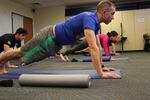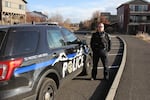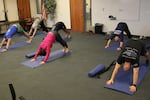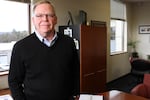Seven police officers spread out on yoga mats in a darkened conferenced room at the Bend Police Station.
They wore their full uniform: badges, guns, vests. It was the end of this patrol group’s shift, and they were settling in for a 10-minute mindfulness meditation session.
A gentle, British-accented voice floated from speakers across the room.
“You’ve become more aware now of how the body feels,” the voice drones, “a general feeling of tiredness, heaviness, of lightness, of energy.”
The mindfulness training is one of several wellness initiatives at the Bend Police Department, which all combined make the 105-officer force stand out among the 18,000 law enforcement departments nationwide.

Bend Police spends about $18,000 a year to bring in a yoga teacher four days a week. The department has seen a reduction in the severity of workforce injuries among officers since implementing the program.
Amanda Peacher / OPB
Police academies train officers on things like how to safely use a gun or bring a suspect to the ground. Even though the stress of police work is well-documented, officers aren’t often trained in how to manage their own mental and physical health.
The Bend Police Department offers yoga and a gym in addition to the mindfulness training. There’s a buddy system for mental health support and a psychologist on staff.
While other forces in Oregon also offer yoga, Bend seems to be rare in its comprehensive health approach.
“It’s extremely unusual,” said Maria Haberfeld, who co-directs NYPD’s training program. “I’ve been looking at police training for two decades.”
Of course, it's much easier to implement change in a 105-officer police force like Bend's than it is in big cities with thousands of cops.
Still, Haberfeld said she’s not heard of any law enforcement agency across the U.S. with such a strong emphasis on mental and physical health.
“You can count the departments trying this on one hand,” Haberfeld said.
Bend's wellness efforts really started with the loss of an officer in 2014.
A Death On The Force
When Bend police officers talk about Sgt. Johnny Lawrence, they remember him for his loud belly laugh, his excellent detective skills and his eagerness to mentor young officers.
The 43-year-old dad had cropped blonde hair and a kind smile.
Cpl. Erick Supplee met Lawrence when he first started with Bend Police. He had no clue how to be an officer, so his supervisor told him to work with Lawrence.
“He said just follow Johnny around and you’ll figure out what to do real quick,” Supplee said. "I latched onto him, and he was just a great guy."
Supplee and Lawrence quickly became friends. They spent their days off hanging out. Their families went camping together.
But a few years into their friendship, tragedy struck.
Supplee was on a typical evening patrol shift when Lawrence, who’d just finished his own shift, called to see if he wanted to meet for dinner.
Supplee took a break to meet Lawrence and his son at a local fast food restaurant. When they got to the counter Lawrence pulled out his wallet.
“And I thought, ‘John, you don’t need to buy me dinner,'” Supplee recalled. But Lawrence insisted.

Cpl. Erick Supplee willingly participates in health and wellness programs like yoga, mindfulness training and peer support programs.
Amanda Peacher / OPB
They enjoyed a brief dinner, laughing and talking. Supplee went back to patrol, and Lawrence went home.
Less than two hours later, Lawrence’s wife called Supplee’s cellphone. She was out of town that night, and she said their son was telling her something was wrong with Lawrence.
It was a heart attack.
Supplee rushed to Lawrence's house and performed CPR. But by that point, nothing could save him.
Supplee stayed with Lawrence’s body the entire night, waiting for his wife to come back. He thought about how one of his friend’s last actions was to buy him dinner.
Lawrence was that kind of guy, Supplee said.
Heart Attacks Are A Leading Killer
Lawrence’s death shook the Bend Police Department to its core.
“It was a wake-up call for me,” Supplee said. “We need to take better care of ourselves.”
Officers know that their work is inherently stressful.
“Here’s the reality of law enforcement,” said Bend Lt. Brian Beekman. “A given officer in a community goes to the worst, most violent thing that’s happening in any city — all day.”
Related: Astoria Police Try Out Training To Address Implicit Biases
Officers rescue child abuse victims, document fatal car accidents and pore over murder scenes.
“It goes on and on and on,” Beekman said. “When that’s your career, that toxicity, that negativity, it builds up.”
Encountering trauma can wreak havoc on officers' personal lives. Police have high rates of alcohol and substance abuse. They’re more likely to get divorced. Suicide is a leading cause of death.
And officers nationally are about as likely to die by heart attacks as by gunshot. In the last several years alone, BPD has had five officers suffer heart attacks.
After Lawrence’s death, Sgt. Scott Vincent also lost his brother to a heart attack. He was a 53-year old officer who had retired just the year before.
“It was probably the lowest time of my life,” Vincent said.
Vincent thought about how both Lawrence’s and his brother’s deaths might have been prevented by simple heart screenings.
“You have to put your sorrow into action,” Vincent said. “We started to look holistically at the health and balance of our officers.”
Vincent and Beekman launched a health and wellness program for the Bend Police Department and called it the Johnny Lawrence Project.
It included a head-to-toe assessment. They looked at strength and physical flexibility, took mental health assessments and blood tests. Participating officers got heart screenings and took home monitors to gauge how well they were sleeping. They met with dietitians, kept food journals and tracked calorie intake.
Vincent said he “hacked” his way through creating the assessment. The department got a $25,000 grant from the St. Charles Foundation. Doctors and physical therapists donated time and expertise. They were able to complete the four-month assessments using no dollars from the police department, but they had to make up the wellness program as they went.
“In law enforcement, if you want to enhance your DUI training, you can grab that model off the shelf and deploy it,” Beekman said. “In many respects, we’re in uncharted territory."
The force is now using the data it's been collecting for training and education. For example, yoga classes now emphasize back and shoulder mobility after the assessment revealed that officers struggle with injuries in those areas. They also found that 47 percent of officers weren’t getting good sleep, with the night shifts and varied schedules of patrol life. The department is planning in-service training with sleep specialists and dietitians.

Officers typically carry 30 pounds of gear on their bodies including vests, boots and weapons. Yoga helps keep these officers flexible and can help prevent injuries.
Amanda Peacher / OPB
Not everyone in the department participated in the assessment, and not every cop does yoga or mindfulness training. For some, it’s a little too touchy feely. But Vincent said that 57 out of 105 officers participating in the Johnny Lawrence Project is a good turnout for the fledgling program.
“Johnny was one of the most beloved guys in the department,” he said. “When you see a 43-year-old die, unexpectedly, it resonates with you. You wonder, ‘Am I good?'”
Healthy Cops Are Better For Communities
Since these wellness programs began, BPD hasn't seen a reduction in the number of officer injuries on the job, but it has observed that workplace injuries have been less severe. The department has also noted that officers are missing fewer days of work due to injury, which translates to less overtime costs.
For Bend Police Chief Jim Porter, these programs are vital, given how much he demands of his force.

Bend Police Chief Jim Porter believes teaching officers how to keep good health leads to better officer performance and better results for the community.
Amanda Peacher / OPB
“We’re asking them to be at peak performance,” Porter said. “If you ask your officers to go out there and do an exceptional job, work harder, handle more cases per shift and reduce the amount of force they use, it means you have to build in resilience and you have to take care of that officer.”
Use of force still happens while Bend officers are on the job. Supplee himself shot and killed an unarmed man in 2013. The shooting was ruled justified. The Bend department also received scrutiny in 2016 for the fatal shooting of an unarmed man at a traffic stop. That shooting was also ruled justified.
But Bend police have seen more than a 30 percent reduction overall in use of force over the past three years. It’s impossible to directly link that reduction to yoga or mindfulness. Officers have also been trained in crisis intervention and working with people who have mental health issues.
But Lt. Beekman says one thing is clear: An officer who is clear-minded and physically healthy is going to be better prepared to go into a chaotic and potentially violent situation.
“Let’s say you’re sleep deprived, let’s say you’re physically unhealthy, let’s say you’re mentally unhealthy,” Beekman said. “You can see the path that may take a particular officer down.”
For his part, Vincent said he wants policing to become a profession that doesn’t tear law enforcement officers apart by the time they retire. The cumulative impact of trauma and physical demands on new officers often doesn't manifest itself until those officers reach their 50s.
“They come into this profession healthy, young robust individuals," Vincent said. “They don’t leave that way. Our job is to change that."